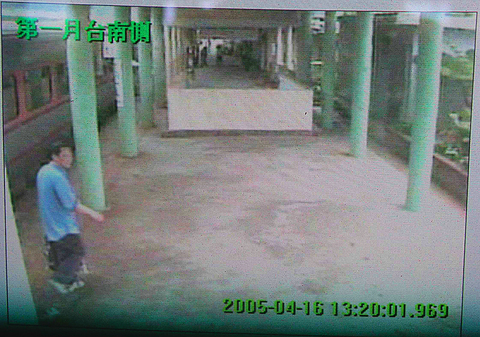Jay Chou (
Several years after the peak of F4's popularity in Taiwan, the four-piece boy band has found a new market in Japan, where the release of Meteor Shower (流星雨) took the band into the top 10 on Japan's main pop chart, marking a first for a Taiwanese band. Previously, the only non-Japanese to make it onto the country's pop chart were Jackie Chan (成龍) and three South Korean singers, all of whom sung in Japanese. F4's album is entirely in Mandarin and still squeezed its way into the No. 10 spot. Whatever's hot in Japan eventually makes its way to Taiwan, so could F4's success there portend a strong comeback at home? Watch for it this summer.
China's hottest export, Zhang Ziyi (

PHOTO: TAIPEI TIMES
The entertainment world suffered a grievous loss this week when one of the greatest Taiwanese comedians and actors, Ni Min-jan (
According to Ni's friends, the legendary veteran comedian had been greatly agitated by recent financial and family problems and suffered severe depression without realizing it.
Ni's second wife, Lee Li-hua (

PHOTO: TAIPEI TIMES
Since Ni's 83-year-old mom has been hospitalized for cancer treatment, the family thought the news would be too much for her and decided to lie about Ni's death as long as they could. One of Ni's best friends, Yu Tien (
On a much happier note, Taiwanese beauty Chen Xiao-xuan (陳孝萱) recently confirmed the good news of her pregnancy after dodging rumors and questions for weeks. She and her metrosexual boyfriend Zhan
Ren-xiong (

PHOTO: TAIPEI TIMES

This is the year that the demographic crisis will begin to impact people’s lives. This will create pressures on treatment and hiring of foreigners. Regardless of whatever technological breakthroughs happen, the real value will come from digesting and productively applying existing technologies in new and creative ways. INTRODUCING BASIC SERVICES BREAKDOWNS At some point soon, we will begin to witness a breakdown in basic services. Initially, it will be limited and sporadic, but the frequency and newsworthiness of the incidents will only continue to accelerate dramatically in the coming years. Here in central Taiwan, many basic services are severely understaffed, and

Jan. 5 to Jan. 11 Of the more than 3,000km of sugar railway that once criss-crossed central and southern Taiwan, just 16.1km remain in operation today. By the time Dafydd Fell began photographing the network in earnest in 1994, it was already well past its heyday. The system had been significantly cut back, leaving behind abandoned stations, rusting rolling stock and crumbling facilities. This reduction continued during the five years of his documentation, adding urgency to his task. As passenger services had already ceased by then, Fell had to wait for the sugarcane harvest season each year, which typically ran from

It’s a good thing that 2025 is over. Yes, I fully expect we will look back on the year with nostalgia, once we have experienced this year and 2027. Traditionally at New Years much discourse is devoted to discussing what happened the previous year. Let’s have a look at what didn’t happen. Many bad things did not happen. The People’s Republic of China (PRC) did not attack Taiwan. We didn’t have a massive, destructive earthquake or drought. We didn’t have a major human pandemic. No widespread unemployment or other destructive social events. Nothing serious was done about Taiwan’s swelling birth rate catastrophe.

Words of the Year are not just interesting, they are telling. They are language and attitude barometers that measure what a country sees as important. The trending vocabulary around AI last year reveals a stark divergence in what each society notices and responds to the technological shift. For the Anglosphere it’s fatigue. For China it’s ambition. For Taiwan, it’s pragmatic vigilance. In Taiwan’s annual “representative character” vote, “recall” (罷) took the top spot with over 15,000 votes, followed closely by “scam” (詐). While “recall” speaks to the island’s partisan deadlock — a year defined by legislative recall campaigns and a public exhausted